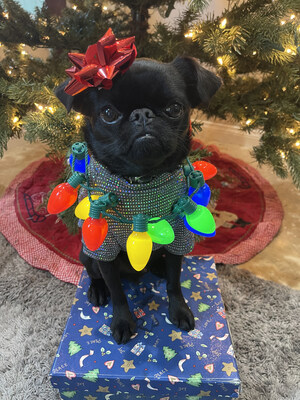
Thanksgiving Tips to Keep Your Pets Safe
Dr. Ruth "The Pet Vet" shares some simple tips to help prevent a visit to the emergency vet clinic
SAN DIEGO, Nov. 13, 2019 /PRNewswire/ -- Every November, emergency vet clinics are inundated with the casualties of Thanksgiving. Besides wrecking your diet, Thanksgiving dinner can spell trouble for your pets. Many pets become ill with intestinal obstructions, chocolate toxicity, and pancreatitis. That's why Dr. Ruth "The Pet Vet" wants to share some simple precautions to help keep your pets safe and healthy this holiday.
"People aren't the only ones who find Thanksgiving dinner irresistible. Unfortunately, pets who get ahold of Thanksgiving turkey are likely to get more than they bargained for," says Dr. Ruth "The Pet Vet." "With so many tempting Thanksgiving dishes, it is imperative for people to take precautions to avoid an unnecessary trip to the emergency clinic."
Obesity
Calorie-filled holiday feasts and sweets can lead to a few post-Thanksgiving extra pounds for us and our pets. Although sharing our leftovers with our pets may be in keeping with the holiday spirit of goodwill, it can lead to pet obesity. Pet obesity is associated with significant health problems, such as diabetes, heart disease, and arthritis. In addition, giving leftovers at the table routinely also promotes begging and reinforces bad behavior.
Pancreatitis
Besides leading to obesity, eating fatty holiday foods can also cause a life-threatening inflammation of the pancreas gland called pancreatitis. In pets, pancreatitis is usually caused by ingestion of fatty foods like turkey, ham, gravy, and chicken skins. If left untreated, it can be fatal. Instead of giving your pet leftovers from your holiday meal, give your pet a dog or cat treat or a new toy.
Bones
Bones also pose a serious danger to pets. Poultry bones are dangerous because they can splinter and get lodged in the gastrointestinal tract and therefore should never be given to pets. Ham and beef bones can break teeth or can also cause intestinal obstructions. If you wish to give your pet a special holiday treat, instead of giving them bones, consider giving them a healthy dental treat specially intended for safe chewing and dental hygiene.
Chocolate Toxicity (and other dangerous foods)
Fortunately, most people know that chocolate can be toxic to pets. Chocolate can cause vomiting, diarrhea, seizures and even death so keep all chocolate out of your pet's reach. Other common foods toxic to pets include xylitol (the artificial sweetener found in sugar-free food), grapes, onions, and alcohol.
Lost Pets
Although the holidays are usually joyous times, they can be marred when our pets get lost. The excess commotion and revolving door of visiting guests can frighten our pets and give them the opportunity to run away. If your pet tends to easily get scared or nervous, it is important to confine them in a room away from the crowds. Remember all pets, even strictly indoor cats, should have collars with tags and microchips so that if they become lost they can be returned safely home.
Paying careful attention to these warnings will help keep the Thanksgiving holidays happy for you and your pet and should prevent unscheduled visits to the vet.
For more pet health tips go to: www.DrRuthPetVet.com/pet-tips
Facebook @DrRuthMacPete
Instagram @drruthmacpete
Twitter @drruthpetvet
About Dr. Ruth MacPete, aka Dr. Ruth "The Pet Vet"
Dr. Ruth MacPete is a veterinarian, media correspondent, and author. She has appeared on The Doctors, Good Morning America, Fox & Friends, The Weather Channel, as well as numerous news shows around the country. She has written about pets and pet health for various magazines such as Bark, Cat Fancy, Kittens USA, Fetch!, and recently published her first children's book Lisette the Vet. To learn more about Dr. MacPete go to: www.DrRuthPetVet.com.
SOURCE Dr. Ruth MacPete -- The Pet Vet







Share this article